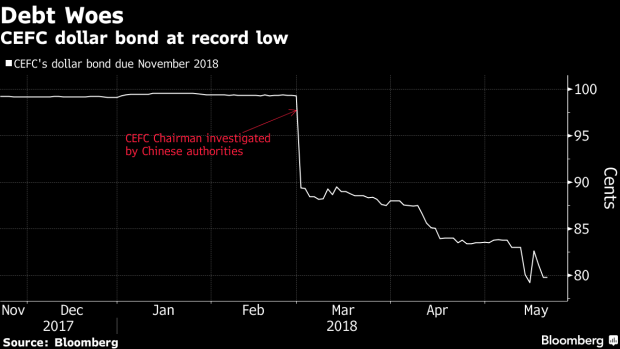May 21, 2018
Bond Payment Looms for Crumbling CEFC After Rosneft Deal Fails
, Bloomberg News

(Bloomberg) -- As corporate defaults pile up in China’s onshore bond market, all eyes are on whether a once-promising energy conglomerate with $4.8 billion of debt and a checkered past will meet its payment obligation Monday.
CEFC Shanghai International Group Ltd., a unit of the privately-held CEFC China Energy Co., said a week ago it may not be able to repay 2 billion yuan ($315 million) of bonds due May 21 because its chairman’s failure to “fulfill normal responsibilities” had a huge impact on the company’s operations.
Worries among investors about surging default rates in China are deepening after at least four nonpayments in the onshore market over the past month. Given the magnitude of the CEFC’s debt load, market stability will hinge on how it implements a debt workout plan, according to Fitch Ratings.
CEFC rise and fall mirrors some of China’s other sprawling, acquisitive private companies under pressure by President Xi Jinping’s crackdown on risky loans and capital outflows. The firm’s rapid ascent peaked with its agreement in September to buy a $9 billion stake in Russian oil behemoth Rosneft PJSC. That deal fell apart this month as financial troubles emerged after its chairman, Ye Jianming, came under investigation by Chinese authorities and stepped down from management.
Two calls each to CEFC Shanghai representatives and the general line of its parent company went unanswered.
Looming Deadline
CEFC racked up its debt pile through a series of ever-bigger deals in recent years for energy and finance assets across Eastern Europe and the Middle East, as well as in China. If it misses the 5 p.m. local time deadline for the bond payment, it would immediately trigger a cross default on its $250 million dollar notes, according to a bond offering circular seen by Bloomberg, and also raise uncertainty on the rest of its outstanding debt.
“The market is generally expecting that CEFC probably won’t repay the bond due today,” said Wang Ying, a senior director at Fitch Ratings in Shanghai. “Given that CEFC has a huge amount of outstanding bonds, an orderly and transparent debt restructuring is required to provide fair compensation to investors and to maintain market stability.”
China’s increased tolerance for company defaults comes as the government steps up efforts to curb leverage and rein in regional borrowings. Finance costs for weaker companies are on the rise. Yield premium of one-year AA- rated bonds over AAA rated notes widened 55 basis points this quarter, the biggest increase since 2015. S&P Global Ratings said defaults by private companies won’t necessarily trigger systemic risks so they won’t shake the government’s resolve to curb leverage.
‘Face Losses’
“If you want to take real efforts to curb corporate deleverage, you will certainly go through pains and face losses.” said Christopher Lee, managing director of corporate ratings at S&P in Hong Kong.
Some of the CEFC’s creditors saw a glimmer of hope after it repaid an overdue 85 million yuan of debt sold on Phoenix Finance, a local Internet finance platform ahead of a deadline last week. CEFC has a total of 30.8 billion yuan of outstanding bonds, including the $250 million dollar bond due in November.
Creditors to CEFC China Energy have formed a committee to review its asset disposals amid rising pressure to repay debt. The conglomerate’s largest creditor, China Development Bank, will lead the committee that will play an active role in the restructuring of debt and asset disposals, people familiar with the matter had said in March. Any final decisions will be taken by the Shanghai government, which has taken control of the company, the people said.
To contact Bloomberg News staff for this story: Judy Chen in Shanghai at xchen45@bloomberg.net
To contact the editors responsible for this story: Neha D'silva at ndsilva1@bloomberg.net, Chan Tien Hin, Ramsey Al-Rikabi
©2018 Bloomberg L.P.


